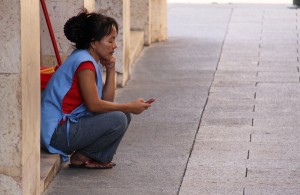And here’s the text of the piece the BBC aired in September, or you can listen here.
There is an old saying here in the Middle East that a woman’s grave remains open for forty days after childbirth; so I guess now is a good time to reflect on my recent experience of the maternity ward of a large hospital here in Beirut.
That’s far from the only adage I’ve heard over the last nine months. Folk wisdom is held in higher esteem than white coats and I was warned against a great many evils, from ketchup to crossing my legs. My local well-wishers spurned modern ultrasound and confidently told me the baby’s gender, basing their conclusions on what I ate and whether I looked more or less attractive than pre-pregnancy. Admittedly, their gender predictions were only wrong half the time. The few who were not categorical invariably told me, “Inshallah it’s a boy, God willing.”
Given this traditional social backdrop, I wasn’t sure what to expect during my brief hospital stay for the delivery, so I dropped by for a tour of the facilities. The façade was shiny and modern, though the effect was somewhat undermined by signs warning visitors that: “Firearms are strictly forbidden in the hospital”. In the delivery suite I innocently asked the doctor whether there would be a mirror on the day to see the crowning as in some European hospitals. “No,” he told me, deadpan, “that’s what you get for giving birth in the third world.”
The irony became apparent when the midwife showed me round the accommodation options, which have clearly been borrowed from a hotel brochure. “There’s first class, second class, junior suite and VIP,” she said. “The top-end rooms boast a separate sitting room, a fridge, a PC, Wi-Fi and a webcam.” I looked at the plaque on the door of the sitting room marking it as the exclusive reserve of the patient’s guests. “That must help keep all those visitors out of your way,” I suggested, and she made a face.
“What’s the no-frills option like?” I asked. She showed me rooms shared by two beds with an en suite loo and the shower down the corridor. Not exactly hardship. Still, what would people think? In death, perhaps, all are equal, but for the Lebanese, social distinction is just as important in sickness as in health.
The fact that a hospital does better business by reducing its patient capacity in order to provide hotel-style creature comforts is rather telling. In this tiny country, where first world meets third, luxury has become almost mundane. Extravagance is not just for the rich, the lower middle classes are getting their dose too.
Domestic help epitomises this trend. Here, live-in maids are more common than dishwashers. Unlike the latest Whirlpool appliance, they still work during the daily power cuts and they’ve got a lot more functions. And just like those one-time luxury machines in the West, immigrant workers are now cheap enough in Lebanon for families on a very average income, costing about $200/£150 a month.
But cheap labour is not the only factor behind this generalisation of luxury. Society here feels an overriding need to be seen living the high life. The civil war shook up the fortunes of many and new money has been decisive to the way that people have tried to redefine their sense of identity. When dozens of friends and family turn up the day after you’ve given birth – because they will – it now matters that you have a VIP lounge with your name on it and a fridge to store the delicacies they bring. Once home, having hired staff open the door to your guests in a frilly apron is just another way to keep up with the neighbours.
In fact, 24/7 home help is so run-of-the-mill in Beirut that new distinctions are needed to establish one’s social standing, giving free rein to racial prejudice. A Filipina with pale skin and good English may be favoured over a Bangladeshi, while a Malagasy import tops the charts for many who want their children to grow up speaking French.
As I leave the hospital, I give the parking guy my pink ticket – because valet parking isn’t just for posh restaurants and hotels, it’s for anything from corner shops to fast food chains. He expects a decent tip, of course. After all, aren’t all Westerners rich? I wonder what he would think if he knew that back home we park our own cars when we’re not on the bus, and that most people giving birth share a ward with another three to five women.
Thinking back, as my grave prepares to close again, I reckon there are harder places to dodge death for forty days.

Interesting article! It’s weird how perceptions change. We were talking about Beirut as a couple of my friends had gone there on holiday and my mother was surprised because she said when she thought of Beirut she thought gritty, politically charged, etc. I said when I thought of Beirut I thought of glamorous women, plastic surgery and nightlife. She said it’s because she’s older but I think Lebanon is both of these and so much more.
You’ve pretty much said it Jasmine. Lebanon is all that and then some.
“When dozens of friends and family turn up the day after you’ve given birth – because they will”
I envy you. You got a whole day to rest after your delivery! That’s true luxury!
Haha – did I give myself away? Ok I admit, I didn’t actually receive visitors until 48 hours after the fact; I guess a good dose on Englishness is hanging on in there.